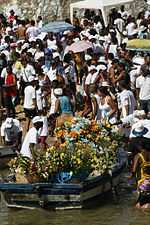Yemoja
Yemoja is a spirit from the Yoruba religion. She is an Orisha and the mother of all Orishas. She is often syncretized with either the Virgin Mary, Our lady of Regla, or Stella Maris.
Name variants
- Yoruba: Yemọja
- Portuguese: Yemanjá, Iemanjá, Janaína, Mãe da Água
- Spanish: Yemayá, Iemanyá, Iemanjá, Yemallá, Llemanjá, Madre del Agua
- French: Iemanja, La Sirène, Mami Wata, Mère de L'Eau
Africa
In Yoruba mythology, Yemoja is a mother spirit; patron spirit of women, especially pregnant women; the ocean; and the Ogun river. Her name is a contraction of the Yoruba words "Yeye omo eja" which means "Mother whose children are like fish." This represents the vastness of her motherhood, her fecundity, and her reign over all living things.
As Nana Borocum or Nana Burku, she is pictured as a very old woman, dressed in black and mauve, connected to mud, swamps, and earth. Nana Buluku is a Vodun in Dahomey mythology.
Americas
Brazil

Umbanda worships Yemanjá as one of the seven Orixás. She is the Queen of the Ocean, the patron spirit of the fishermen and the survivors of shipwrecks, the feminine principle of creation, and the spirit of moonlight. She is syncretized with Nossa Senhora dos Navegantes (Our Lady of the Seafaring).
In Salvador, Bahia, Iemanjá is celebrated by Candomblé on the very same day consecrated by the Catholic Church to Our Lady of Seafaring (Nossa Senhora dos Navegantes).[1][2] Every February 2, thousands of people line up at dawn to leave their offerings at her shrine in Rio Vermelho. Gifts for Iemanjá usually include flowers and objects of female vanity (perfume, jewelry, combs, lipsticks, mirrors). These are gathered in large baskets and taken out to the sea by local fishermen. Afterwards a massive street party ensues.
Iemanjá is also celebrated every December 8 in Salvador, Bahia. The Festa da Conceição da Praia (Feast to Our Lady of Conception of the church at the beach) is a city holiday dedicated to the Catholic saint and also to Iemanjá. Another feast occurs on this day in the Pedra Furada, Monte Serrat in Salvador, Bahia, called the Gift to Iemanjá, when fishermen celebrate their devotion to the Queen of the Ocean.
On New Year's Eve in Rio de Janeiro, millions of cariocas, of all religions, dressed in white gather on Copacabana beach to greet the New Year, watch fireworks, and throw white flowers and other offerings into the sea for the goddess in the hopes that she will grant them their requests for the coming year. Some send their gifts to lemanjá in wooden toy boats. Paintings of lemanjá are sold in Rio shops, next to paintings of Jesus and other Catholic saints. They portray her as a woman rising out of the sea. Small offerings of flowers and floating candles are left in the sea on many nights at Copacabana.
In São Paulo State, Iemanjá is celebrated in the two first weekends of December on the shores of Praia Grande city. During these days many vehicles garnished with Iemanjá icons and colors (white and blue) roam from the São Paulo mountains to the sea littoral, some of them traveling hundreds of miles. Thousands of people rally near Iemanjá's statue in Praia Grande beach.
In Pelotas, Rio Grande do Sul State, on February 2, the image of Nossa Senhora dos Navegantes is carried to the port of Pelotas. Before the closing of the catholic feast, the boats stop and host the Umbanda followers that carry the image of Iemanjá, in a syncretic meeting that is watched by thousand of people on the shore.[3]
Uruguay
In Montevideo, worshippers gather on Ramirez Beach in the Parque Rodo neighborhood every February 2 to celebrate Iemanjá Day.[4] Hundreds of thousands sit waiting for the sunset before they launch small boats with offerings into the ocean.
In 2015, the Uruguayan government estimated that 100,000 people[5] had visited the beach for the celebrations.
Cuba
In Santería, Yemayá is the mother of all living things as well as the owner of the oceans and seas.[6]
References
- ↑ "Mother of the Waters" (1988) a film by Elisa Tesser offers a poetic evocation of this ceremony with interviews in which devotees describe their relationship to the goddess and how she has appeared to them.
- ↑ pt:Iemanjá#Brasil
- ↑ Pelo Rio Grande - Nossa Senhora dos Navegantes é homenageada com procissões
- ↑ Uruguay Festivals – Day of the Goddess of the Sea, Guru'guay
- ↑ Así se vivió la fiesta de Iemanjá en la costa de Montevideo, Subrayado, Feb 3 2015
- ↑ A. De LA Torre, Miguel; La Torre, Miguel A., De (2004). Santería: the beliefs and rituals of a growing religion in America. Grand Rapids, Mich.: William B. Eerdmans Pub. Co. pp. 97–98. ISBN 0-8028-4973-3.
- Lloyd Weaver and Olukunmi Egbelade.,"Lloyd Weaver and Olurunmi Egbelade, Yemoja: Maternal Divinity, Tranquil Sea, Turbulent Tides" Athelia Henrietta Press (1998) ISBN 978-1-890157-10-4
| ||||||||||||||||||||||||||||